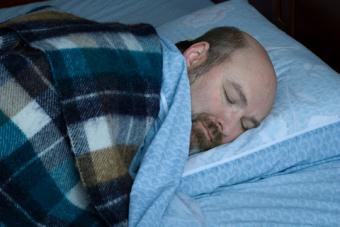
Talking in your sleep is a parasomnia known as somniloquy. Parasomnias such as sleep talking occur during the non-rapid eye movement (NREM) stages of sleep.
Parasomnia: Talking in Your Sleep
Have you ever told someone something while you were sleeping and then not remembered it later? It's happened to everyone at one time or another, a husband or a wife will wake the other up to tell them something without realizing their partner isn't really awake. Their partner may respond, but later when fully awake have no recollection of the event. This is a type of talking in your sleep, but it's not quite a parasomnia.
Common in Childhood
Somniloquy, like other NREM parasomnias, is often common in childhood. Sleep talking episodes decrease as a person ages. When a person talks in their sleep the words may not be audible to another person and come out just as a mumble. They may say a handful of words, they may give a large speech, they may be unintelligible or they may be candidly clear. Sleep talking is as individual as the person speaking.
Sleep Talking Triggers
While sleep talking may decrease in frequency as a person gets older, it may also be triggered by environmental and personal factors. Stress, alcohol, medications, fevers, sleep deprivation and depression may all contribute to a person's sleep talking. If you run a high fever, you may talk, rant, yell, cry or otherwise talk in your sleep.
How Do You Talk in Your Sleep?
When you talk in your sleep, you are usually not moving smoothly between the different stages of sleep. The disturbance does not have to be profound enough to arouse you fully, but it can lead to confusion in whether you are awake or asleep. Related NREM sleep disturbances include sleepwalking and night terrors.
You are capable of speech, you are capable of moving and what you may think you are saying in your dream, you are actually saying out loud. Your memory of the event will be limited to what you remember of a dream and may contain a dreamlike quality and feel "not real" even when others tell you that you were talking.
Related to Sleep Talking
REM sleep behavior disorder is similar to somniloquy, except that you are not just mumbling in your sleep. Instead, you are loud, obnoxious and sometimes profane in your language. You may yell at someone, curse at them or be exceptionally emotional. Chances are large that you will not remember what is said, but it can be very disturbing for the person who hears you.
Sleepwalking occurs because motor skills engage while you are sleeping, allowing you to stand, walk, move and even operate a car. Night terrors are periods of intense fear, shouting and screaming. A person who experiences night terrors does not typically remember the dreams, but are physically reactive to the terror they experienced (sweating, rapid pulse, gasping for air, screaming).
Sleep Talking is Not Dangerous
About 50 percent of children sleep talk at some point or other. It is thought to be a way they process the large amounts of information they obtain during the day. Sleep talking also seems to run in families. While sleep talking is not dangerous, it can be very aggravating to others especially if they misinterpret what you are saying as actual talking.
Sleep Talking Prevention
While sleep talking itself is harmless, the more dramatic, intense or emotional sleep talking is, the more likely it is an indicator of a sleep disorder or other more serious problem. Mouth guards are available (usually your physician can recommend) to help prevent sleep talking if it is a nuisance.
If you suspect that sleep talking is a serious problem, you can use a recorder to monitor your sleep or have your partner use a recorder when your episodes begin. Be sure to consult a physician and they may recommend a sleep study to test the severity of the sleep talking.







